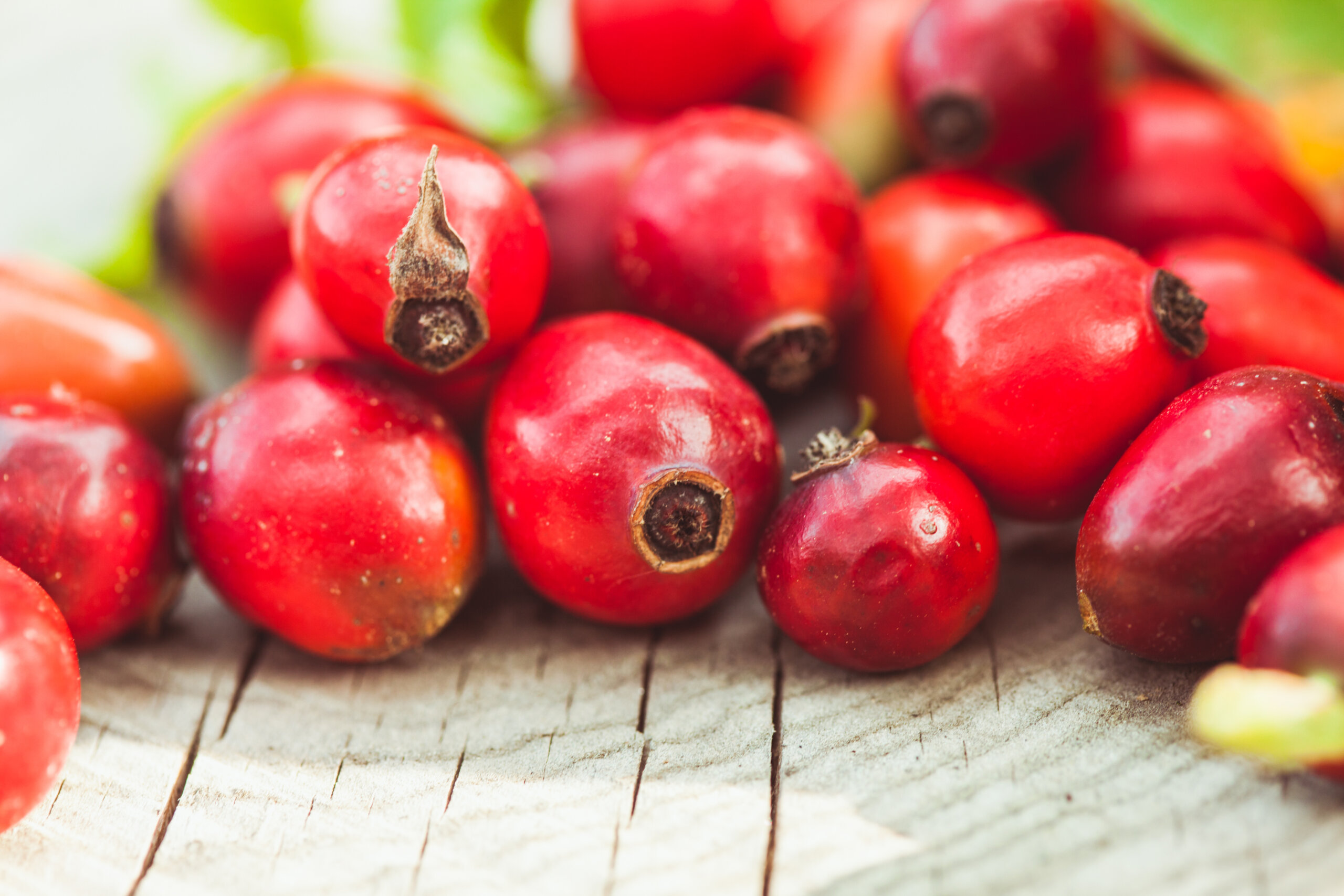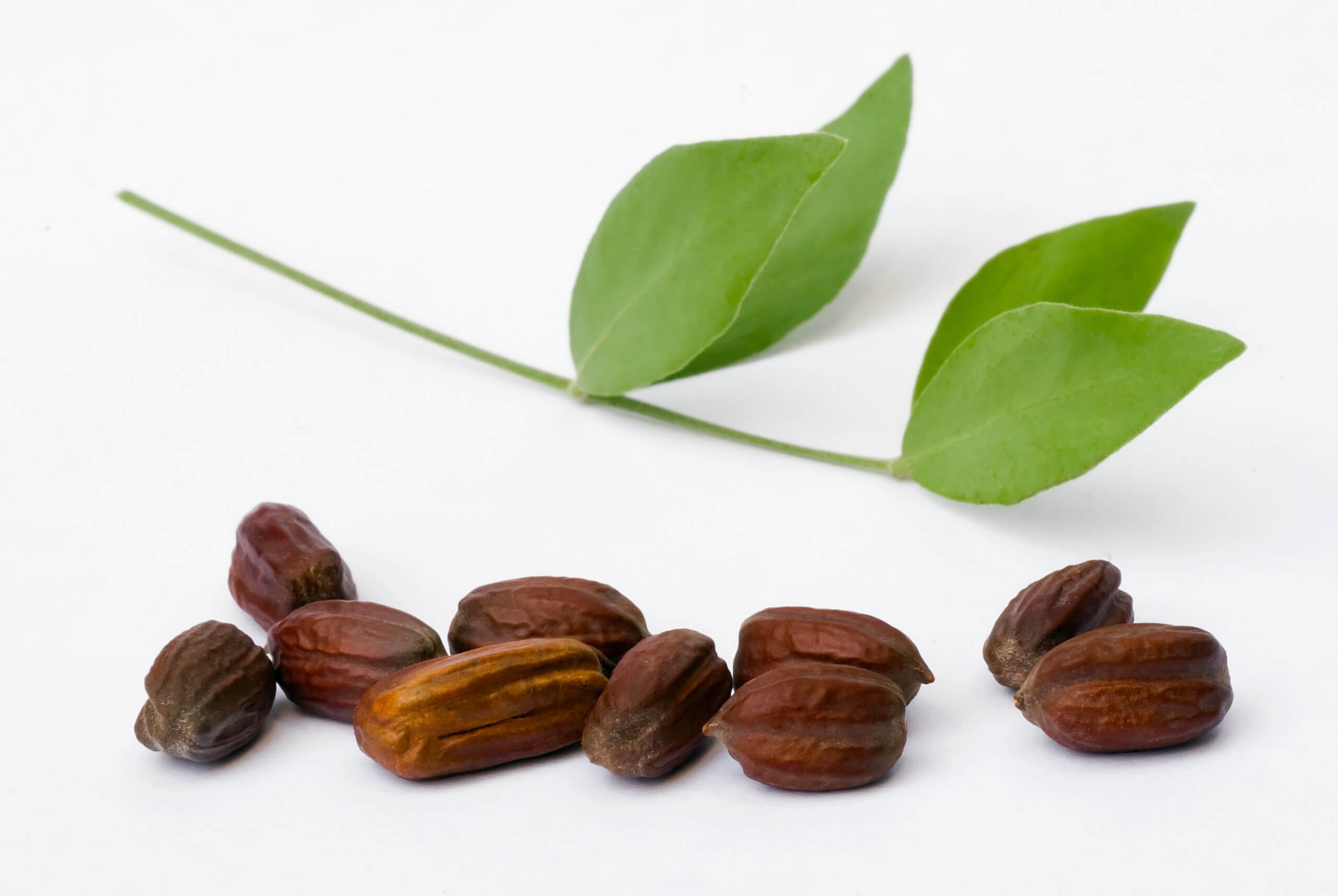Rosehip and jojoba oil: you’ve likely heard of them both, but which is better for your skin?
Both oils yield powerful anti-aging and hydrating effects, which make them great for use on mature skin — they’re even used in hair care products to enhance shine, and hydrate your scalp!
Let’s dive into the differences between these two popular oils so you can decide which is the best choice for your skincare arsenal.
What Is Rosehip Oil? + Top Skin Benefits

Rosehip seed oil comes from the reddish-orange pseudo fruits of the rose plant. These fruits are bursting with vitamin C, essential fatty acids, and a number of additional vitamins and minerals that play a key role in combating visible signs of aging.
Additionally, rosehip oil is known for its aid in helping protect the skin barrier. In other words, it helps to lock in moisture for better skin hydration while also supporting natural sebum production.
Let’s take a closer look at each of the top skin benefits of rosehip oil.
Locks in Hydration
Rosehip oil is rich in omega fatty acids and antioxidants, which play a key role in maintaining the lipid barrier of your skin and supporting oil production. Lipids fill the spaces between your cells, sort of like mortar or cement, and help maintain moisture by preventing too much water from evaporating.
May Brighten & Even Skin Tone
Vitamin C is a powerful antioxidant found in rosehip oil that helps your skin look brighter, and has the potential to fade the appearance of hyperpigmentation and acne scars. The vitamin A found in rosehip oil– mainly in the form of beta-carotene– encourages rejuvenation, mainly through a process known as skin cell turnover, which helps combat the appearance of redness, dullness, and uneven skin tone.
May Help Protect Skin from Photodamage
There are a number of reasons why your skin ages, one of the main ones being photodamage. Photodamage occurs when your skin gets exposed to too much UV radiation from the sun, and affects your skin at the cellular level. This damage results in dark spots, roughness, wrinkles, fine lines, loss of elasticity, and so on. Fortunately, the vitamin C and vitamin E found in rosehip oil may work together to provide protection against photodamage (and the other antioxidants help, too).
What Is Jojoba Oil? + Top Skin Benefits

Jojoba oil comes from the seeds of the jojoba plant Simmondsia chinensis. And although jojoba is technically a wax ester, it functions just like an oil and has a lot to offer your complexion.
Jojoba oil is particularly rich in vitamin E and a range of natural antioxidants that offer anti-inflammatory properties. This makes it beneficial if you deal with skin issues like flakiness, red-looking skin, or even itchiness.
Here are the top skin benefits of jojoba oil.
Soothes Irritated Skin
Thanks to its anti-inflammatory properties, jojoba oil can be very soothing for minor skin irritations and inflammation, potentially even helping eczema or psoriasis. And because it also possesses antimicrobial properties, jojoba seed oil may help to calm breakouts as well. At the very least, it shouldn’t make acne worse due to its non-comedogenic (non pore-clogging) nature and ability to help balance sebum production.
May Help Protect Against Free Radical Damage
Free radical damage can occur in your skin due to sun overexposure, or from toxins like air pollutants and can lead to visible signs of aging (like fine lines and wrinkles). The good news is that jojoba oil contains vitamin E, which has been shown to protect against photodamage, particularly when applied topically. This means jojoba seed oil could help shield your skin from free radicals (particularly the ones stimulated by UV rays) and their damaging effects..
Has the Potential to Boost Collagen
Collagen is an important protein that helps your skin stay firm, supple, and thick. Unfortunately, production of this protein declines as you age, resulting in wrinkles and visible signs of aging. Research has linked the topical application of antioxidants (which jojoba oil contains) to enhanced collagen production, and a preliminary study indicates jojoba could stimulate collagen synthesis. So, though not conclusively proven, jojoba seed oil may prove to be a natural collagen booster, which is great news for your skin.
Is Rosehip or Jojoba Oil Better for Skin?
It’s clear that both rosehip and jojoba oil offer powerful nourishing and anti-aging properties. But is one better than the other?
The answer: It’s mostly a matter of preference.
Rosehip is a rich oil packed with vitamin C, omega-3 fatty acids, and a variety of natural antioxidants. This makes it a great skincare option if you have mature skin, and struggle with dryness and/or issues like hyperpigmentation.
On the other hand, jojoba oil is slightly lighter in formula, making it a better option for a combination of different skin types. Its powerhouse, of vitamin E and anti-inflammatory properties, offers soothing protection for soft, supple skin. Plus, if you struggle with irritation or acne, jojoba seed oil is an excellent choice.
 Using Rosehip & Jojoba Oils for Youthful-Looking Skin
Using Rosehip & Jojoba Oils for Youthful-Looking Skin
Jojoba and rosehip oils are both great beauty ingredients to add to your skincare routine. And since each one offers hydrating and anti-aging effects, you may even consider adding both.
For example, if you’re looking to soak up the deeply nourishing properties of rosehip oil, try the Age-Defying Eye-Cream from Purity Woods. Gentle enough to use on delicate skin, this moisturizing eye cream offers intense hydration and effectively combats the appearance of dark circles, crow’s feet, and more.
Or for a hydrating cleanser that contains jojoba oil, and a powerful blend of nature’s most rejuvenating ingredients, try the Pur-Radiance Face Cleanser from Purity Woods. It gently cleanses your skin– no harsh stripping– while also going to work against visible signs of aging.
Both products are fully USDA Certified Organic (which means zero toxins or synthetic ingredients) and formulated only with pure botanicals.
The bottom line: You really can’t go wrong with either rosehip or jojoba oil for your skin!

